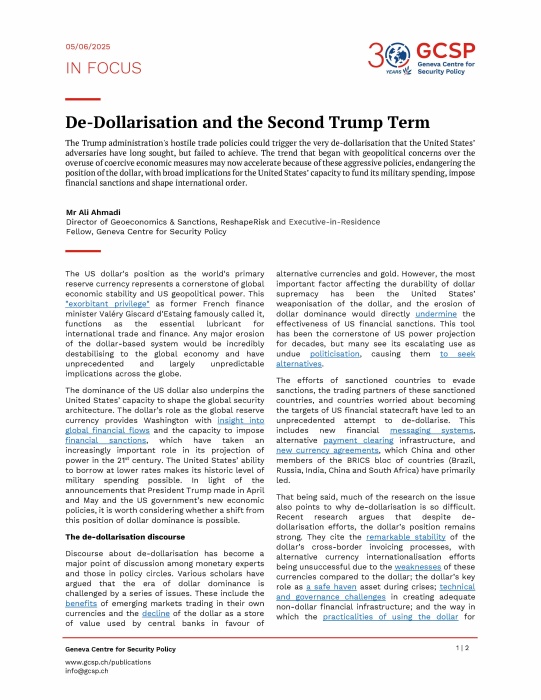De-Dollarisation and the Second Trump Term
The Trump administration's hostile trade policies could trigger the very de-dollarisation that the United States’ adversaries have long sought, but failed to achieve. The trend that began with geopolitical concerns over the overuse of coercive economic measures may now accelerate because of these aggressive policies, endangering the position of the dollar, with broad implications for the United States’ capacity to fund its military spending, impose financial sanctions and shape international order.
The US dollar's position as the world's primary reserve currency represents a cornerstone of global economic stability and US geopolitical power. This "exorbitant privilege" as former French finance minister Valéry Giscard d'Estaing famously called it, functions as the essential lubricant for international trade and finance. Any major erosion of the dollar-based system would be incredibly destabilising to the global economy and have unprecedented and largely unpredictable implications across the globe.
The dominance of the US dollar also underpins the United States’ capacity to shape the global security architecture. The dollar’s role as the global reserve currency provides Washington with insight into global financial flows and the capacity to impose financial sanctions, which have taken an increasingly important role in its projection of power in the 21st century. The United States’ ability to borrow at lower rates makes its historic level of military spending possible. In light of the announcements that President Trump made in April and May and the US government’s new economic policies, it is worth considering whether a shift from this position of dollar dominance is possible.
The de-dollarisation discourse
Discourse about de-dollarisation has become a major point of discussion among monetary experts and those in policy circles. Various scholars have argued that the era of dollar dominance is challenged by a series of issues. These include the benefits of emerging markets trading in their own currencies and the decline of the dollar as a store of value used by central banks in favour of alternative currencies and gold. However, the most important factor affecting the durability of dollar supremacy has been the United States’ weaponisation of the dollar, and the erosion of dollar dominance would directly undermine the effectiveness of US financial sanctions. This tool has been the cornerstone of US power projection for decades, but many see its escalating use as undue politicisation, causing them to seek alternatives.
The efforts of sanctioned countries to evade sanctions, the trading partners of these sanctioned countries, and countries worried about becoming the targets of US financial statecraft have led to an unprecedented attempt to de-dollarise. This includes new financial messaging systems, alternative payment clearing infrastructure, and new currency agreements, which China and other members of the BRICS bloc of countries (Brazil, Russia, India, China and South Africa) have primarily led.
That being said, much of the research on the issue also points to why de-dollarisation is so difficult. Recent research argues that despite de-dollarisation efforts, the dollar’s position remains strong. They cite the remarkable stability of the dollar’s cross-border invoicing processes, with alternative currency internationalisation efforts being unsuccessful due to the weaknesses of these currencies compared to the dollar; the dollar’s key role as a safe haven asset during crises; technical and governance challenges in creating adequate non-dollar financial infrastructure; and the way in which the practicalities of using the dollar for businesses and central banks outweigh the political will to de-dollarise. Ultimately, there are only two instances where the world has seen a major shift in the global reserve currency in the last 400 years, and both instances involved major wars.
“Liberation Day” and its aftermath
The recent tumult involving the US government’s decisions on trade policy pitches this discourse into a different framework. The primary drivers of de-dollarisation, for those warning about the process being under way or a significant future threat were geopolitical circumstances and the increased weaponisation of the dollar by the US government since the terrorist attacks in New York and Washington of 11 September 2001. The fact that investors, central banks, firms, and countries had no viable alternative currency with which to replace the dollar served as a compelling counter-argument to these warnings in this context.
Growing international concerns about US financial management are reducing demand for dollar-based systems and assets, a trend that is potentially being accelerated by current policies that challenge dollar dominance. Recent tariff policy shifts have prompted rising long-term US Treasury yields, marking an unprecedented moment when market uncertainty failed to strengthen the dollar or boost bond demand.
These elevated yields reflect diminished confidence in US fiscal management following decades of disruption of the trade policy consensus. Higher borrowing costs increase debt servicing expenses while constraining corporate and consumer spending, contributing to economic contraction and reduced growth forecasts. While de-dollarisation previously focused on concerns about the overuse of sanctions, current market dynamics reflect the immediate erosion of confidence that Washington’s lack of fiscal discipline will likely intensify under the Trump administration.
Risk points and long-term uncertainty
With US growth slowing down, the Trump administration is likely to renew its criticism of the Federal Reserve's interest rate policies with vigour. Trump has repeatedly criticised the Fed’s decisions on its benchmark interest rates and wants rate cuts that would stimulate economic growth. His direct attacks against Federal Reserve chairman Jerome Powell have been particularly concerning, because the attractiveness of the US dollar is largely due to the perception of its stability as a result of US monetary policy being set by an independent Federal Reserve that does not have to bow to edicts of the executive branch of government.
In light of the inflationary pressures that already existed from the previous period of inflation, which Powell has acknowledged, and the increased inflationary pressure that is likely to come due to price shocks in the US economy caused by tariffs, lowering interest rates is likely not a viable option, because it would further exacerbate this problem. Rather, the Federal Reserve is likely to maintain its current posture or even increase interest rates as a means of keeping inflation in check.
This could result in an unprecedented standoff between Trump and the Federal Reserve on monetary policy. Even if Powell stands strong against presidential interference in monetary policy, which he has indicated he would do, his term will end in May 2026, in which case Trump would be appointing his replacement. Trump has previously shown interest in appointing loyal partisans to Federal Reserve positions, but was deterred by a fearful reaction from the markets. A historic reversal in the Federal Reserve’s independence and an abandonment of its strong dollar policy, which is a critical source of stability for both the dollar and the US economy, could deal a striking and irreversible blow to the credibility of the US dollar.
Conclusion
Meaningful de-dollarisation would have profound implications for the global security architecture, reducing the United States’ capacity to fund its military and impose coercive economic pressure. For European allies and democratic partners, this erosion of dollar-based financial leverage would have significant economic implications and would limit the West's ability to impose coordinated sanctions, fundamentally reshaping the calculus of global conflict management.
Disclaimer: The views, information and opinions expressed in this publication are the author’s/authors’ own and do not necessarily reflect those of the GCSP or the members of its Foundation Council. The GCSP is not responsible for the accuracy of the information.


